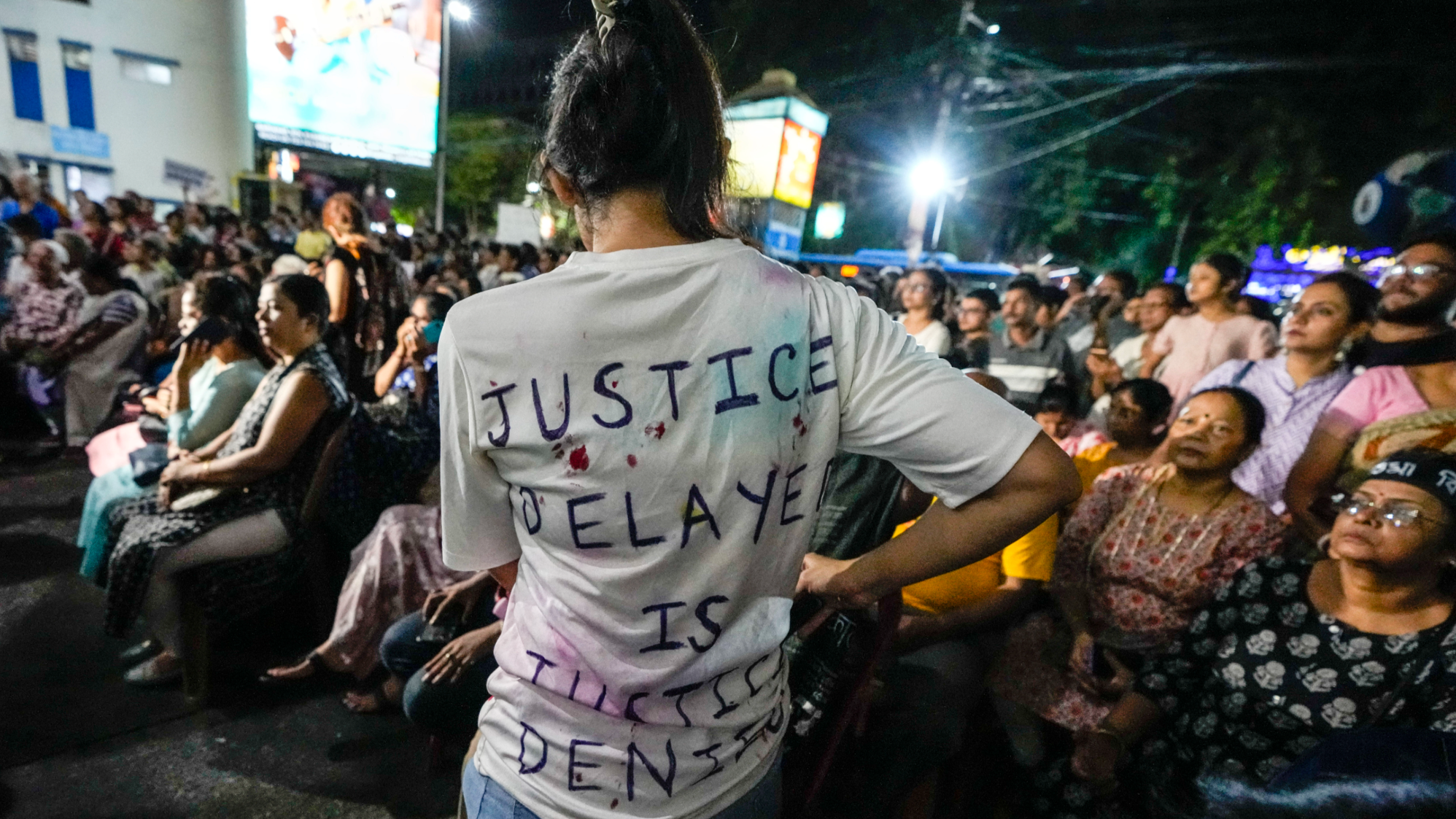
India's Supreme Court’s order to protesting doctors to resume work on Tuesday triggered widespread disappointment among those who had been demanding justice for a female doctor who was found raped and murdered at a state-run hospital in Kolkata, the state capital of West Bengal.
A bench headed by Chief Justice Dhananjaya Yeshwant Chandrachud said on Monday that no adverse action will be taken against the protesting doctors if they resume work, following assurances from the West Bengal government.
On Aug 9, the body of the 31-year-old female doctor was found in a seminar hall of the R.G. Kar Medical College and Hospital (RGKMCH), a prominent state state-run hospital in the eastern Indian city. An autopsy later confirmed that the woman, who had a lot of injury marks on her body, had been sexually assaulted.
READ MORE: Indian hospitals hit as doctors strike to protest rape, murder of colleague
Hundreds of doctors across India remained off work following the brutal crime. Doctors working in state-run medical colleges and hospitals have staged protests to seek justice for the victim.
Protests have also erupted in major Indian cities, where tens of thousands of women and ordinary people have been participating in several rallies seeking justice for the murdered doctor.
On Sept 8, thousands of overseas Indians staged protests in more than 130 cities across 25 countries, demanding justice.
The protests started in large and small groups across Japan, Australia and Singapore, before spreading to cities in several European countries. As many as 60 protest rallies were planned in the United States.
"We direct that the junior doctors have to resume work by 5 pm tomorrow, and no action should be taken against them till that time. We direct that if the doctors do not resume work, then we cannot stop the state government from taking disciplinary action against them. If they resume work, then no action against them as we are seized of the matter," the Supreme Court said on Sept 9.
The West Bengal Junior Doctor’s Front, which is spearheading the protest in the region, alleged that justice is still elusive since only a police volunteer had been arrested in connection with the doctor’s death.
"We were expecting a positive outcome, keeping in mind the brutality of the offense. We are, however, totally disheartened by the proceedings of the court and the Central Bureau of Investigation or CBI," the Indian Medical Association, the largest national voluntary organization of physicians, said in a release following the Supreme Court order.
"No step was taken for a speedy trial to deliver justice to our colleague,” it said.
The protesting doctors have been demanding that all perpetrators of the crime be identified and that an investigation is held to look into possible tampering of evidence by the local police and local government. They have also called for better amenities in public hospitals, such as resting spaces for staff, as well as the speedy overhauling of a law to protect healthcare workers.
“If a woman doctor can be killed in a hospital while on duty, we women doctors can’t feel safe,” said a junior protesting doctor at RGKMCH who requested not to be identified.
“I need to feel safe inside the hospital and we want to see justice being done to our departed colleague,” said Shreya Shaw, a protesting doctor and a postgraduate medical student at RGKMCH.
After the court hearing, many junior doctors lamented that verbal assurances alone would not make them feel safe enough to resume work.
All doctors are too scared to return to work until all the perpetrators involved in the heinous crime are arrested, said Sams Mushafir, another junior doctor at the hospital.
“We are doctors, we want to work, it is our duty. It is not a happy occasion for us to stay away from our patients,” said Aniket Mahata, another doctor at the hospital. The doctors were hoping for some developments in the pursuit of justice, added Mahata.
The Supreme Court, during the hearing, expressed serious concern as it found plenty of discrepancies allegedly perpetrated by the Kolkata police and state government while conducting the autopsy on the victim.
Kolkata police were initially investigating the case. Following a court order last month, the investigation was handed over to the CBI, India’s premier investigating agency.
Meanwhile, Kolkata witnessed a unique and powerful protest when residents turned off their lights for an hour from 9 pm on Sept 4, and thousands of women came out to the streets with lighted candles as a mark of their protest.
After the Supreme Court hearing, West Bengal Chief minister Mamata Banerjee appealed to the protesting doctors as well as the people of Bengal: “One month over, come back to festivities.”
READ MORE: Indian medics refuse to end protests over doctor's rape and murder
Bengali's greatest festival, Durga Puja, is scheduled for early next month.
The chief minister’s appeal had caused widespread resentment among the public, opposition political leaders and doctors. On Sept 9, the Left Front, comprising India’s Communist parties, organized a protest rally in the city demanding the chief minister’s immediate resignation.
Several opposition parties in the state, including Prime Minister Narendra Modi's ruling Bharatiya Janata Party, alleged that the chief minister is trying to protect the real culprits involved in the crime.
The writer is a freelance journalist for China Daily.


